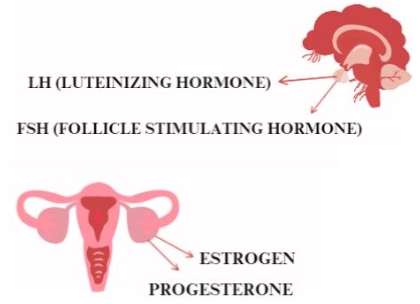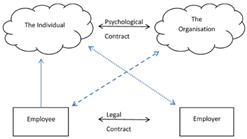Impact of COVID-19 on depressive symptoms in older adults: Future perspectives and implications
Abstract
During the pre-pandemic era, around 280 million people worldwide were diagnosed with depression. Depression is one of the leading causes of disability, affecting 5.7 per cent of people aged 60 and over during the pre-pandemic period. The COVID-19 pandemic has resulted in a significant increase in the incidence of depression, with an estimated increase of 28.1 per cent worldwide, with a significant impact on older adults. The consequences of the increase in depressive symptoms can have a long-term impact and, in this sense, this problem is a global challenge for mental health professionals. Knowing the impact of COVID-19 on depressive symptoms in older adults will allow mental health professionals to be better prepared for a future pandemic crisis and to develop interventions aimed at reducing depressive symptoms in this population. The development of interventions that promote mental health is crucial now and, in the future, so knowing the impact of the pandemic crisis on depressive symptoms is useful in pursuing this goal. The aim of this article is to describe some recent results on the impact of COVID-19 on depressive symptoms in older adults, and to discuss possible future perspectives.
References
Aihara, Y., & Kiyoshi, M. (2021). Depressive symptoms in community-dwelling older adults in Japan before and during the COVID-19 pandemic. International Journal of Geriatric Psychiatry, 36(7), 1122–1123. Portico. https://doi.org/10.1002/gps.5558
Almeida, J. (2015). Global mental health, depression, anxiety and risk behaviors in higher education students: a prevalence and correlation study [Universidade Nova de Lisboa] (Portuguese). Available online: http://hdl.handle.net/10400.11/2939 (accessed on 30 October 2024).
Amarya, S., Singh, K., & Sabharwal, M. (2018). Ageing Process and Physiological Changes. Gerontology. https://doi.org/10.5772/intechopen.76249
APA. (2014). DSM-V: Diagnostic and Statistical Manual of Mental Disorders (Portuguese). Climepsi Editores.
Arenas, D., Makrakis, M., Pádua, A., & Pádua, M. (2018). Depressive Disorders in the Elderly (Portuguese). Edipucrs.
Bonanad, C., García-Blas, S., Tarazona-Santabalbina, F., et al. (2020). The Effect of Age on Mortality in Patients With COVID-19: A Meta-Analysis With 611,583 Subjects. Journal of the American Medical Directors Association, 21(7), 915–918. https://doi.org/10.1016/j.jamda.2020.05.045
Briggs, R., McDowell, C. P., De Looze, C., et al. (2021). Depressive Symptoms Among Older Adults Pre– and Post–COVID-19 Pandemic. Journal of the American Medical Directors Association, 22(11), 2251–2257. https://doi.org/10.1016/j.jamda.2021.09.003
Cenedesi Júnior, M. A., Malta, A. do M. M., Feitoza, H. F. F., et al. (2023). The mental health of the elderly in the context of the COVID-19 pandemic: cognitive, emotional, and social/behavioral aspects. Contribuciones a las ciencias sociales, 16(12), 33358–33384. https://doi.org/10.55905/revconv.16n.12-256
Chang, C. H., Lee, K. Y., & Shim, Y. H. (2017). Normal aging: definition and physiologic changes. Journal of the Korean Medical Association, 60(5), 358. https://doi.org/10.5124/jkma.2017.60.5.358
Chao, A. M., Wadden, T. A., Clark, J. M., et al. (2021). Changes in the Prevalence of Symptoms of Depression, Loneliness, and Insomnia in U.S. Older Adults with Type 2 Diabetes During the COVID-19 Pandemic: The Look AHEAD Study. Diabetes Care, 45(1), 74–82. https://doi.org/10.2337/dc21-1179
Chao, S. F., & Yu, M. H. (2021). COVID-19-Related Worries, Social Disruptions, and Depressive Symptoms Among Community-Dwelling Older Adults with Disabilities: What Makes the Difference? The Journals of Gerontology, Series B: Psychological Sciences and Social Sciences, 79(4). https://doi.org/10.1093/geronb/gbab157
Courtin, E., & Knapp, M. (2015). Social isolation, loneliness and health in old age: a scoping review. Health & Social Care in the Community, 25(3), 799–812. Portico. https://doi.org/10.1111/hsc.12311
Ettman, C. K., Abdalla, S. M., Cohen, G. H., et al. (2020). Prevalence of Depression Symptoms in US Adults Before and During the COVID-19 Pandemic. JAMA Network Open, 3(9), e2019686. https://doi.org/10.1001/jamanetworkopen.2020.19686
Foster, L., & Walker, A. (2014). Active and Successful Aging: A European Policy Perspective. The Gerontologist, 55(1), 83–90. https://doi.org/10.1093/geront/gnu028
Fry, C. L. (2017). The social construction of age and the experience of aging in the late twentieth century. In: New Dynamics in Old Age. Routledge.
Ganesan, B., Gowda, T., Al-Jumaily, A., et al. (2019). Ambient assisted living technologies for older adults with cognitive and physical impairments: a review. European Review for Medical and Pharmacological Sciences, 23(23), 10470-10481.
Irmak, A. Y., Çelikkalp, Ü., & Ekuklu, G. (2020). Evaluation of the chronic disease management and depression levels of people over 65 years of age during the COVID-19 pandemic period. Perspectives in Psychiatric Care, 57(3), 1409–1416. Portico. https://doi.org/10.1111/ppc.12706
Islam, N., Sharp, S. J., Chowell, G., et al. (2020). Physical distancing interventions and incidence of coronavirus disease 2019: natural experiment in 149 countries. BMJ, m2743. https://doi.org/10.1136/bmj.m2743
James, S. L., Abate, D., Abate, K. H., et al. (2018). Global, regional, and national incidence, prevalence, and years lived with disability for 354 diseases and injuries for 195 countries and territories, 1990-2017: a systematic analysis for the Global Burden of Disease Study 2017. The Lancet, 392(10159), 1789-1858. https://doi.org/10.1016/S0140-6736(18)32279-7
John, J. R., Jani, H., Peters, K., et al. (2020). The Effectiveness of Patient-Centered Medical Home-Based Models of Care versus Standard Primary Care in Chronic Disease Management: A Systematic Review and Meta-Analysis of Randomized and Non-Randomized Controlled Trials. International Journal of Environmental Research and Public Health, 17(18), 6886. https://doi.org/10.3390/ijerph17186886
Kim, M. J., Park, C., Sharp, L. K., et al. (2022). Impact of worries associated with COVID-19 on diabetes-related psychological symptoms in older adults with Type 2 diabetes. Geriatric Nursing, 43, 58–63. https://doi.org/10.1016/j.gerinurse.2021.11.006
Kivi, M., Hansson, I., & Bjälkebring, P. (2020). Up and About: Older Adults’ Well-being During the COVID-19 Pandemic in a Swedish Longitudinal Study. The Journals of Gerontology: Series B, 76(2), e4–e9. https://doi.org/10.1093/geronb/gbaa084
Lima, T. M., Silva, V. de S., Moura, L. L. M. da S. D. de, et al. (2021). Nursing interventions in depressed elderly: a literature review/nursing interventions in depressed elderly: a literature review (Portuguese). Brazilian Journal of Development, 7(2), 11870–11883. https://doi.org/10.34117/bjdv7n2-014
Lin, T. W., Richman, J. A., Johnson, T. P., et al. (2024). Lingering Effects of COVID-19 Stressors on Mental Health and Alcohol Use in Middle Aged to Older Adults. Aging and Health Research, 4(1), 100178. https://doi.org/10.1016/j.ahr.2023.100178
Mendez-Lopez, A., Stuckler, D., McKee, M., et al. (2022). The mental health crisis during the COVID-19 pandemic in older adults and the role of physical distancing interventions and social protection measures in 26 European countries. SSM-Population Health, 17, 101017. https://doi.org/10.1016/j.ssmph.2021.101017
Mistry, S. K., Ali, A. R. M. M., Hossain, M. B., et al. (2021). Exploring depressive symptoms and its associates among Bangladeshi older adults amid COVID-19 pandemic: findings from a cross-sectional study. Social Psychiatry and Psychiatric Epidemiology, 56(8), 1487–1497. https://doi.org/10.1007/s00127-021-02052-6
Müller, F., Röhr, S., Reininghaus, U., et al. (2021). Social Isolation and Loneliness during COVID-19 Lockdown: Associations with Depressive Symptoms in the German Old-Age Population. International Journal of Environmental Research and Public Health, 18(7), 3615. https://doi.org/10.3390/ijerph18073615
Noguchi, T., Hayashi, T., Kubo, Y., et al. (2021). Association between Decreased Social Participation and Depressive Symptom Onset among Community-Dwelling Older Adults: A Longitudinal Study during the COVID-19 Pandemic. The Journal of Nutrition, Health and Aging, 25(9), 1070–1075. https://doi.org/10.1007/s12603-021-1674-7
Nogueira, V. (2016). Depression and Suicide (Portuguese). In: Saúde Mental Das Pessoas Mais Velhas. Lidel.
OMS. (2005). Active ageing: A health policy (Portuguese). Available online: https://bvsms.saude.gov.br/bvs/publicacoes/envelhecimento_ativo.pdf (accessed on 30 October 2024).
OMS. (2021). Depression. Available online: https://www.who.int/news-room/fact-sheets/detail/depression (accessed on 30 October 2024).
Pérez, L. M., Castellano-Tejedor, C., Cesari, M., et al. (2021). Depressive Symptoms, Fatigue and Social Relationships Influenced Physical Activity in Frail Older Community-Dwellers during the Spanish Lockdown due to the COVID-19 Pandemic. International Journal of Environmental Research and Public Health, 18(2), 808. https://doi.org/10.3390/ijerph18020808
Pierce, M., Hope, H., Ford, T., et al. (2020). Mental health before and during the COVID-19 pandemic: a longitudinal probability sample survey of the UK population. The Lancet Psychiatry, 7(10), 883-892. https://doi.org/10.1016/S2215-0366(20)30308-4
Porter, C., Favara, M., Hittmeyer, A., et al. (2021). Impact of the COVID-19 pandemic on anxiety and depression symptoms of young people in the global south: evidence from a four-country cohort study. BMJ Open, 11(4), e049653. https://doi.org/10.1136/bmjopen-2021-049653
Ray, K. K. (2023). COVID-19 pandemic and the determinants of depressive symptoms among senior citizens of India: An empirical investigation. Asian Social Work and Policy Review, 17(3), 196–207. Portico. https://doi.org/10.1111/aswp.12286
Robbins, R., Weaver, M. D., Czeisler, M. É., et al. (2021). Associations Between Changes in Daily Behaviors and Self-Reported Feelings of Depression and Anxiety About the COVID-19 Pandemic Among Older Adults. The Journals of Gerontology: Series B, 77(7), e150–e159. https://doi.org/10.1093/geronb/gbab110
Saraiva, C., & Cerejeira, J. (2014). Fundamental psychiatry (Portuguese). Lidel.
Schmauck-Medina, T., Molière, A., Lautrup, S., et al. (2022). New hallmarks of ageing: a 2022 Copenhagen ageing meeting summary. Aging, 14(16), 6829–6839. https://doi.org/10.18632/aging.204248
Shahid, Z., Kalayanamitra, R., McClafferty, B., et al. (2020). COVID-19 and Older Adults: What We Know. Journal of the American Geriatrics Society, 68(5), 926–929. Portico. https://doi.org/10.1111/jgs.16472
Shields, M., Tonmyr, L., Gonzalez, A., et al. (2021). Symptoms of major depressive disorder during the COVID-19 pandemic: results from a representative sample of the Canadian population. Health Promotion and Chronic Disease Prevention in Canada, 41(11), 340–358. Internet Archive. https://doi.org/10.24095/hpcdp.41.11.04
Silva, C., Fonseca, C., Ferreira, R., et al. (2022). Depression in older adults during the COVID-19 pandemic: a systematic review protocol. BMJ Open, 12(10), e065610. https://doi.org/10.1136/bmjopen-2022-065610
Silva, C., Fonseca, C., Ferreira, R., et al. (2023). Depression in older adults during the COVID-19 pandemic: A systematic review. Journal of the American Geriatrics Society, 71(7), 2308–2325. Portico. https://doi.org/10.1111/jgs.18363
Strulik, H. (2023). The Routledge Handbook of the Economics of Ageing. Routledge.
Valer, D. B., Bierhals, C. C. B. K., Aires, M., et al. (2015). The significance of healthy aging for older persons who participated in health education groups. Revista Brasileira de Geriatria e Gerontologia, 18(4), 809–819. https://doi.org/10.1590/1809-9823.2015.14042
van Tilburg, T. G., Steinmetz, S., Stolte, E., et al. (2020). Loneliness and Mental Health During the COVID-19 Pandemic: A Study Among Dutch Older Adults. The Journals of Gerontology: Series B, 76(7), e249–e255. https://doi.org/10.1093/geronb/gbaa111
Voss, G., Paiva, A. F., & Delerue Matos, A. (2021). A Study of the Association between the Stringency of Covid-19 Government Measures and Depression in Older Adults across Europe and Israel. International Journal of Environmental Research and Public Health, 18(15), 8017. https://doi.org/10.3390/ijerph18158017
WHO. (2015). World report on ageing and health. World Health Organization.
World Health Organization. (2021). Depression. Available online: https://www.who.int/News-Room/Fact-Sheets/Detail/Depression (accessed on 30 October 2024).
Yan, Y., Shin, W. I., Pang, Y. X., et al. (2020). The First 75 Days of Novel Coronavirus (SARS-CoV-2) Outbreak: Recent Advances, Prevention, and Treatment. International Journal of Environmental Research and Public Health, 17(7), 2323. https://doi.org/10.3390/ijerph17072323
Zaninotto, P., Iob, E., Demakakos, P., et al. (2022). Immediate and Longer-Term Changes in the Mental Health and Well-being of Older Adults in England During the COVID-19 Pandemic. JAMA Psychiatry, 79(2), 151. https://doi.org/10.1001/jamapsychiatry.2021.3749
Zenebe, Y., Akele, B., W/Selassie, M., et al. (2021). Prevalence and determinants of depression among old age: a systematic review and meta-analysis. Annals of General Psychiatry, 20(1). https://doi.org/10.1186/s12991-021-00375-x
Zhou, F., Yu, T., Du, R., et al. (2020). Clinical course and risk factors for mortality of adult inpatients with COVID-19 in Wuhan, China: a retrospective cohort study. The Lancet, 395(10229), 1054-1062. https://doi.org/10.1016/S0140-6736(20)30566-3
Copyright (c) 2024 Celso Silva, Mónica Lopo Tomaz

This work is licensed under a Creative Commons Attribution 4.0 International License.









